- Honour Code
- CSR Commitments
- Trademark Policy
- Authentication
- How to Cite
- Legal Executive

Case Summaries
- Jurisprudence
- Legal Writing
- Legal English
UOL Case Bank
- A-Level Law
- Exam Skills
- LLB Admissions
- PGDL / GDL Admissions
- MA Law Admissions
- MLaw Admissions
- LLM Admissions
- JD Admissions
- Law Schools
- Law Modules
- Study Skills
- Careers Advice
- Job Openings
- Internships
How to Write a Law Essay Plan
Writing a law essay requires a strategic approach, and a well-organised plan is the key to a successful essay. A thoughtful essay plan not only helps in structuring your arguments coherently but also ensures that you address all relevant legal issues. In this guide, we will explore the essential steps to create an effective law essay plan.
Understand the Question
Before diving into your essay plan, thoroughly understand the question or prompt. Identify the key legal issues and concepts that need to be addressed. Pay attention to the specific requirements, such as whether you are expected to analyse, evaluate, or argue a particular point of view.
Research Thoroughly
Conduct comprehensive research on the topic, gathering relevant legal precedents, statutes, cases, and scholarly articles. Ensure that your sources are authoritative and up-to-date. A solid understanding of the legal landscape is crucial for constructing a well-informed and persuasive argument.
Create a Thesis Statement
Develop a clear and concise thesis statement that encapsulates the main argument of your essay. Your thesis should address the central legal question and provide a roadmap for the reader, outlining the key points you will be discussing in your essay.
Identify Sub-Issues and Arguments
Break down the main legal issues into sub-issues and identify the arguments you will present for each. This step helps you organise your thoughts and ensures a logical flow in your essay. Each sub-issue should contribute to the overall thesis of your essay.
Create an Outline
Outline the structure of your essay, dividing it into introduction, body paragraphs, and conclusion. Each section should serve a specific purpose. The introduction should introduce the topic and present your thesis, while the body paragraphs delve into the main arguments and legal analysis. The conclusion should summarise your key points and restate your thesis.
Allocate Word Count
Allocate a word count to each section of your essay based on its importance in conveying your argument. This ensures that you give sufficient attention to each aspect of your analysis without overemphasising certain points at the expense of others.
Legal Analysis and Authorities
Within your plan, clearly indicate where you will incorporate legal analysis and reference relevant authorities. This can include citing cases, statutes, regulations, or scholarly opinions. The integration of legal authorities strengthens your argument and demonstrates a sound understanding of the legal principles involved.
Review and Revise
Once your initial plan is complete, take the time to review and revise. Ensure that your arguments are logically structured, and there is a clear progression from one point to the next. Check for coherence and relevance in each section, making adjustments as needed.
A well-crafted law essay plan is the foundation for a compelling and persuasive piece of legal writing. By understanding the question, conducting thorough research, and systematically organising your thoughts, you can create an essay plan that not only meets the academic standards but also effectively communicates your legal analysis and insights. Following this guide will set you on the path to producing a high-quality law essay that demonstrates your command of legal principles and your ability to construct a coherent and well-argued piece of legal writing.
Trusted by thousands of law students worldwide
All 30 law modules (best value), all 18 uol modules (uol international programme), sqe foundation package, pgdl / gdl law conversion, 12 qualifying llb modules (uol standard entry route), 9 qualifying llb modules (uol graduate entry route), first year llb modules (uol standard entry route), first year llb modules (uol graduate entry route), law exam guide, second year llb modules (uol standard entry route), second year llb modules (uol graduate entry route), third year llb modules (uol standard entry route), third year llb modules (uol graduate entry route), contract law, legal english and writing, legal executive package (level 6), certhe common law (uol international programme), graddip commercial law (uol international programme), graddip international law (uol international programme), where are our students from.
Yale University
Council of Europe
Baker Mckenzie
University of Chicago
Columbia University
New York University
University of Michigan
University College London (UCL)
London School of Economics (LSE)
King’s College London (KCL)
University of London
University of Manchester
University of Zurich
University of York
Brandeis University
University of Exeter
University of Sheffield
Boston University
University of Washington
University of Leeds
University of Law
Royal Holloway, University of London
Birkbeck, University of London
SOAS, University of London
University of Kent
University of Hull
Queen’s University Belfast
Toronto Metropolitan University
Hong Kong University of Science and Technology
Your perfect companion for open-book and closed-book exams
Diagrams and charts.
Our carefully designed diagrams and charts will guide you through complex legal issues.
Clear and Succinct Definitions
Key concepts are concisely defined to help you understand legal topics quickly.
Statutory Provisions
Statutory provisions are provided side by side with legal concepts to help you swiftly locate the relevant legislation.
We have summarised important cases for you so that you don't need to read long and boring cases.
Rules and Exceptions
Rules and exceptions are clearly listed so that you know when a rule applies and when it doesn't.
Terminology
Legal terms and key concepts are explained at the beginning of each chapter to help you learn efficiently.
Case law is provided side by side with legal concepts so that you know how legal principles and precedents were established.
Law Essay Guide
You will learn essential law exam skills and essay writing techniques that are not taught in class.
Problem Question Guide
We will show you how to answer problem questions step by step to achieve first-class results.
Structured Explanations
Complex legal concepts are broken down into concise and digestible bullet point explanations.
Legal Research
You will learn legal research techniques with our study guide and become a proficient legal researcher.
Exam-focused
All essential concepts, principles, and case law are included so that you can answer exam questions quickly.
- American Express
By using this website, you agree to our use of cookies. We use cookies to provide necessary site functionality and provide you with a great experience.
Post A Comment
Flag comment.
Are you sure you'd like to flag this comment as inappropriate?
Thank you for commenting
Your comment is awaiting moderation, and will be published as soon as it has been approved
Delete Comment
You're logged in as the blog owner. Would you like to delete this comment?
Your message has been successfully sent
Your form has been submitted. Please check your email for a copy of your responses. If you're accepted, you'll receive an email with a link to checkout.
Could not add item to cart
Username or email *
Password *
Forgotten password?
[email protected]
+44 (0)20 8834 4579
How to Write a First-Class Law Essay
Studying law at university entails lots of essay writing. This article takes you through the key steps to writing a top law essay.
Writing a law essay can be a challenging task. As a law student, you’ll be expected to analyse complex legal issues and apply legal principles to real-world scenarios. At the same time, you’ll need to be able to communicate your ideas clearly and persuasively. In this article, we’ll cover some top tips to guide you through the process of planning, researching, structuring and writing a first-class law essay with confidence.
1. Start In Advance
Give yourself plenty of time to plan, research and write your law essay. Always aim to start your law essay as soon as you have the question. Leaving it until the last minute does not only create unnecessary stress, but it also leaves you insufficient time to write, reference and perfect your work.
2. Understand The Question
Do not begin until you fully comprehend the question. Take the time to read the question carefully and make sure that you understand what it’s asking you to do. Highlight key terms and annotate the question with definitions of key concepts and any questions that you have have. Think about how the question links back to what you’ve learned during your lectures or through your readings.
3. Conduct Thorough Research
Conducting thorough research around your topic is one of the most fundamental parts of the essay writing process. You should aim to use a range of relevant sources, such as cases, academic articles, books and any other legal materials. Ensure that the information you collect is taken from relevant, reliable and up to date sources. Use primary over secondary material as much as possible.
Avoid using outdated laws and obscure blog posts as sources of information. Always aim to choose authoritative sources from experts within the field, such as academics, politicians, lawyers and judges. Using high-quality and authoritative sources and demonstrating profound and critical insight into your topic are what will earn you top marks.
4. Write A Detailed Plan
Once you’ve done your research, it’s time to plan your essay. When writing your plan, you’ll need to create an outline that clearly identifies the main points that you wish to make throughout your article. Try to write down what you wish to achieve in each paragraph, what concepts you want to discuss and arguments you want to make.
Your outline should be organised in a clear, coherent and logical manner to ensure that the person grading your essay can follow your line of thought and arguments easily. You may also wish to include headings and subheadings to structure your essay effectively This makes it easier when it comes to writing the essay as starting without a plan can get messy. The essay must answer the question and nothing but the question so ensure all of your points relate to it.
Start Writing Like A Lawyer
Read our legal writing tips now
5. Write A Compelling Introduction
A great introduction should, firstly, outline the research topic. The introduction is one of the most crucial parts of the law essay as it sets the tone for the rest of the paper. It should capture the readers attention and provide the background context on the topic. Most importantly, it should state the thesis of your essay.
When writing your introduction, avoid simply repeating the given question. Secondly, create a road map for the reader, letting them know how the essay will approach the question. Your introduction must be concise. The main body of the essay is where you will go into detail.
6. Include A Strong Thesis Statement
Your thesis should clearly set out the argument you are going to be making throughout your essay and should normally go in the introduction. Your thesis should adopt a clear stance rather than being overly general or wishy-washy. To obtain the best grades, you’ll need to show a unique perspective based upon a critical analysis of the topic rather than adopting the most obvious point of view.
Once you’ve conducted your research and had a chance to reflect on your topic, ask yourself whether you can prove your argument within the given word count or whether you would need to adopt a more modest position for your paper. Always have a clear idea of what your thesis statement is before you begin writing the content of your essay.
7. Present the Counter-argument
To demonstrate your deeper understanding of the topic, it’s important to show your ability to consider the counter-arguments and address them in a careful and reasoned manner. When presenting your counterarguments, aim to depict them in the best possible light, aiming to be fair and reasonable before moving on to your rebuttal. To ensure that your essay is convincing, you will need to have a strong rebuttal that explains why your argument is stronger and more persuasive. This will demonstrate your capacity for critical analysis, showing the reader that you have carefully considered differing perspectives before coming to a well-supported conclusion.
8. End With A Strong Conclusion
Your conclusion is your opportunity to summarise the key points made throughout your essay and to restate the thesis statement in a clear and concise manner. Avoid simply repeating what has already been mentioned in the body of the essay. For top grades, you should use the conclusion as an opportunity to provide critical reflection and analysis on the topic. You may also wish to share any further insights or recommendations into alternative avenues to consider or implications for further research that could add value to the topic.
9. Review The Content Of Your Essay
Make sure you factor in time to edit the content of your essay. Once you’ve finished your first draft, come back to it the next day. Re-read your essay with a critical perspective. Do your arguments make sense? Do your paragraphs flow in a logical manner? You may also consider asking someone to read your paper and give you critical feedback. They may be able to add another perspective you haven’t considered or suggest another research paper that could add value to your essay.
10. Proofread For Grammatical Mistakes
Once you’re happy with the content of your essay, the last step is to thoroughly proofread your essay for any grammatical errors. Ensure that you take time to ensure that there are no grammar, spelling or punctuation errors as these can be one of the easiest ways to lose marks. You can ask anyone to proofread your paper, as they would not necessarily need to have a legal background – just strong grammar and spelling skills!
11. Check Submission Guidelines
Before submitting, ensure that your paper conforms with the style, referencing and presentation guidelines set out by your university. This includes the correct font, font size and line spacing as well as elements such as page numbers, table of content etc. Referencing is also incredibly important as you’ll need to make sure that you are following the correct referencing system chosen by your university. Check your university’s guidelines about what the word count is and whether you need to include your student identification number in your essay as well. Be thorough and don’t lose marks for minor reasons!
12. Use Legal Terms Accurately
Always make sure that you are using legal terms accurately throughout your essay. Check an authoritative resource if you are unsure of any definitions. While being sophisticated is great, legal jargon if not used correctly or appropriately can weaken your essay. Aim to be concise and to stick to the point. Don’t use ten words when only two will do.
12. Create a Vocabulary Bank
One recurring piece of advice from seasoned law students is to take note of phrases from books and articles, key definitions or concepts and even quotes from your professors. When it comes to writing your law essay, you will have a whole range of ideas and vocabulary that will help you to develop your understanding and thoughts on a given topic. This will make writing your law essay even easier!
13. Finally, Take Care of Yourself
Last but certainly not least, looking after your health can improve your attitude towards writing your law essay your coursework in general. Sleep, eat, drink and exercise appropriately. Take regular breaks and try not to stress. Do not forget to enjoy writing the essay!
Words by Karen Fulton
Free Guides
Our free guides cover everything from deciding on law to studying and practising law abroad. Search through our vast directory.
Upcoming Events
Explore our events for aspiring lawyers. Sponsored by top institutions, they offer fantastic insights into the legal profession.
Join Our Newsletter
Join our mailing list for weekly updates and advice on how to get into law.
Law Quizzes
Try our selection of quizzes for aspiring lawyers for a fun way to gain insight into the legal profession!
PREVIOUS ARTICLE
Legal Writing: Start Writing Like a Lawyer!
NEXT ARTICLE
LLM Jobs for Graduates
Loading More Content
- PRO Courses Guides New Tech Help Pro Expert Videos About wikiHow Pro Upgrade Sign In
- EDIT Edit this Article
- EXPLORE Tech Help Pro About Us Random Article Quizzes Request a New Article Community Dashboard This Or That Game Popular Categories Arts and Entertainment Artwork Books Movies Computers and Electronics Computers Phone Skills Technology Hacks Health Men's Health Mental Health Women's Health Relationships Dating Love Relationship Issues Hobbies and Crafts Crafts Drawing Games Education & Communication Communication Skills Personal Development Studying Personal Care and Style Fashion Hair Care Personal Hygiene Youth Personal Care School Stuff Dating All Categories Arts and Entertainment Finance and Business Home and Garden Relationship Quizzes Cars & Other Vehicles Food and Entertaining Personal Care and Style Sports and Fitness Computers and Electronics Health Pets and Animals Travel Education & Communication Hobbies and Crafts Philosophy and Religion Work World Family Life Holidays and Traditions Relationships Youth
- Browse Articles
- Learn Something New
- Quizzes Hot
- This Or That Game New
- Train Your Brain
- Explore More
- Support wikiHow
- About wikiHow
- Log in / Sign up
- Education and Communications
- College University and Postgraduate
- Academic Writing
How to Write a Law Essay
Last Updated: August 11, 2023
This article was co-authored by Clinton M. Sandvick, JD, PhD . Clinton M. Sandvick worked as a civil litigator in California for over 7 years. He received his JD from the University of Wisconsin-Madison in 1998 and his PhD in American History from the University of Oregon in 2013. This article has been viewed 239,769 times.
In a college legal studies course, and in some law school courses, you may be required to write a research paper addressing a legal topic. These essays can be tricky, because the law is constantly evolving. To secure a top grade, your essay must be well-researched and coherently argued. With proper planning and research, you can write a stellar legal essay. [Note: this article does not address how to write law school essay exams or bar exam questions, which require different techniques and strategies.]
Choosing an Essay Topic

- A narrow essay prompt might read, "Discuss the evolution and impact of the exclusionary rule of evidence in the United States." A broad prompt might read, "Discuss how a civil rights movement led to changes in federal and/or state law."
- If you are invited to choose your own topic, your professor may require you to submit a written proposal or outline to ensure that your chosen topic complies with the prompt. If you are not sure if your topic is within the parameters of the prompt, propose your topic to your professor after class or during his or her office hours.

- Hopefully, your course readings, lectures, and class discussions will have given you enough background knowledge to select a topic. If not, review your class notes and browse online for additional background information.
- It is not uncommon to change your topic after doing some research. You may end up narrowing the questions your essay will answer, or changing your topic completely.

- If you can, try to focus on an are of the law that affects you. For example, if your family is involved in agriculture, you may be interested in writing about water use regulations .
Researching Your Topic

- If you are prohibited from citing internet resources, you can still use online research to guide you to physical primary and secondary sources in your local library or bookstore.

- Look at footnotes, citations, and indexes in tertiary sources. These are great for finding books, articles, and legal cases that are relevant to your topic. Also take note of the names of authors, who may have written multiple works on your topic.

- Also find search engines for related fields, such as history or political science. Ask your librarian to recommend specialized search engines tailored to other disciplines that may have contributed to your topic.

- Never cut and paste from the web into your notes or essay. This often leads to inadvertent plagiarism because students forget what is a quotation and what is paraphrasing. When gathering sources, paraphrase or add quotation marks in your outline.
- Plagiarism is a serious offense. If you ultimately hope to be a lawyer, an accusation of plagiarism could prevent you from passing the character and fitness review.

Drafting the Essay

- An effective introduction takes the reader out of his world and into the world of your essay. [2] X Trustworthy Source University of North Carolina Writing Center UNC's on-campus and online instructional service that provides assistance to students, faculty, and others during the writing process Go to source Explain why the subject is important and briefly summarizes the rest of your argument. After reading your introduction, your reader should know what you are going to discuss and in what order you will be discussing it.
- Be prepared to revise your introduction later. Summarizing your essay will be easier after you have written it, especially if you deviate from your outline.

- State each argument of your essay as a statement that, if true, would support your thesis statement.
- Provide supporting information drawn from primary and secondary sources that support your argument. Remember to cite your sources.
- Provide your own original analysis, explaining to the reader that based on the primary and secondary sources you have presented, the reader should be persuaded by your argument.

Formatting Your Essay

Proofreading the Essay

- Open up a Word document. On the Quick Access Toolbar at the top, click on the down arrow. The words “Customize Quick Access Toolbar” will appear when you hover over the arrow for two seconds.
- Click on the arrow. Then click on “More Commands.”
- In the “Choose commands from” drop-down box, choose “All commands.”
- Scroll down to find “Speak.” Highlight this and then click “add.” Then click “okay.” Now the Speak function should appear on your Quick Access Toolbar.
- Highlight the text you want read back to you, and then click on the Speak icon. The text will be read back to you.

- Do not rely on a spell checker exclusively, as it will not catch typos like "statute" versus "statue."
Revising the Essay

- You can share the essay with someone outside of class, but a classmate more likely has the requisite knowledge to understand the subject matter of the essay.

Expert Q&A
You might also like.

- ↑ https://owl.english.purdue.edu/engagement/2/2/53/
- ↑ http://writingcenter.unc.edu/handouts/introductions/
- ↑ https://www.legalbluebook.com/
- ↑ https://support.office.com/en-ca/article/Using-the-Speak-text-to-speech-feature-459e7704-a76d-4fe2-ab48-189d6b83333c
About This Article

To write a law essay, start by writing a thesis statement on your chosen topic. Phrase your thesis statement as an argument, using words like “because” or “therefore” to state your point. Write an outline of the arguments you will use to support your thesis statement, then use that outline to build the body of your paper. Include any counter-arguments, but use your evidence to convince the reader why your point of view is valid, and the counter-arguments are not. Be sure to cite all of your sources in the format preferred by your professor. For tips from our reviewer on finding the best sources for your topic, keep reading! Did this summary help you? Yes No
- Send fan mail to authors
Did this article help you?

Featured Articles

Trending Articles

Watch Articles

- Terms of Use
- Privacy Policy
- Do Not Sell or Share My Info
- Not Selling Info
wikiHow Tech Help Pro:
Level up your tech skills and stay ahead of the curve

How to Write a First Class Law Essay

A Fuel Crisis that Continues to Drown the UK

The Rohingya Refugee Crisis

- Tips for Students
- essay writing
- first class
- tips for students

Article written by Caitlin Graham, Lancaster University LLB graduate.
General Tips
Check further reading lists before finding your own sources..
Once you receive your essay question, before trying to identify your own primary and secondary sources, a good starting point is to have a look at your university’s further reading list for whichever topic the question is based upon and then research any of the relevant sources listed. Also, you can find sources by checking the further reading list of the relevant chapter in your main textbook. You can also ask for help from professional research paper writers
Plan before you start writing.
Produce a plan which outlines what all of your main arguments are, how you will make the points, which sources you plan to use, and what your conclusion will be. By having all of your notes and research in your plan in one place, this will prevent any confusion or stress trying to find something later on.
At the end of each main argument, link it back to the question.
You need to answer the question. To ensure you do this, at the end of each key point, include a sentence or two which links it back to the main question.
Make a vocabulary bank on a word document.
Making a list of words that are commonly used in essay writing and having it to hand or in a separate tab on your computer can be really useful if you get stuck whilst writing.
Use sentence starters such as ‘firstly’, ‘furthermore’, ‘therefore’, and ‘in conclusion’.
Using sentence starters will help ensure your writing is fluent and flows.
Only make direct quotations where it makes sense to.
It is not necessary to directly quote every academic commentator that you are making reference to in your essay; instead, for the most part, paraphrase.
Proofread your essay out loud before submitting.
It is very important that you not only proofread your essay before you submit it but that you do so out loud. This will help you filter out any incorrect punctuation and ensure that your writing flows.
How to Answer Each Section of an Essay
The introduction.
You should aim to do four things in your introduction:
- Set out any definitions of any key terms outlined in the essay title or statement of your essay.
- State what the overall aim of your essay is.
- Explain how you plan to achieve this aim.
- Provide a brief summary of what your essay will conclude.

The Main Body of the Essay
The main body of the essay refers to the two or three main arguments. Aim to use a range of primary and secondary sources in this part. It is crucial that critical analysis is used in this section in order to achieve a higher grade. This will mean engaging with primary and secondary sources and identifying the strengths and weaknesses of each point. Furthermore, whilst you should acknowledge both sides of the argument, you should finish by clarifying which side you find more convincing and why.
The Conclusion
A conclusion should:
- Summarise how the essay has achieved its aim.
- Echo what the essay’s position/opinion on the essay question/title is and explain the reasoning behind this.
Do not address any new points or arguments in the conclusion; only refer to ideas that you have already discussed. Keep the conclusion relatively brief – a few sentences should be sufficient.
Imaan Fatima
Related posts.

A Guide to Group Study for Law Students

What to Expect From a Mini-Pupillage

Nurturing the Legal Mind: Prioritising Mental Health in Law School
Comments are closed.

How To Write A Law Essay Plan?
Various steps are involved in creating a plan for a law essay. This includes writing, brainstorming, outlining, creating the draft, and submitting the work. The most effective way to arrange the tasks is to create an outline of one's essay. This will allow a person to keep track of your tasks and ensure you do not miss the most important elements of your essay. In this article, we will discuss what a planned essay's legal outline should be like and how to use it effectively while writing an academic essay.
Strategies to write a law essay:
A high-quality law paper should be well-written, with a solid opening, a persuasive body, and a conclusion that will leave readers looking for more than the paper could have provided. The following steps should be followed in order:
Create an engaging introduction.
Make arguments throughout your document using evidence from sources and case studies.
Finish with powerful closing remarks, rather than just a summary of what was discussed earlier
Start in Advance:
There's nothing more anxious than the last-minute pressure to finish one's law paper. It's inevitable, and yet a person put off studying and writing notes due to the other work piling on one's desk, or in one's virtual inbox, with the ever-growing amount of information. What do you do? Make sure to write everything else down now so that when the moment comes to write, you'll be ready!
Read, Understand and Deconstruct the Question:
Don't begin the task until you've completed the assignment and understood the assignment. Know what you are being asked before beginning, and break down questions into smaller segments.
The most important element of writing a law essay is locating details. It should be accurate, current, reliable, and accurate to ensure one's successful essay. Primary sources are preferred over secondary sources whenever possible. Specialists in law field have more convincing voices than those you read online or see on news programs on television. Have a look at our LLB Law Notes .
Write a Plan:
It is essential to prepare one's essay in advance. Studying the topic will give you a clearer idea of the type of material to incorporate in every paragraph. Get a piece of paper out and write down the things that need to be done in that section of the text in one page, which will aid in writing later once everything has been planned. The entire purpose behind an argumentative essay such as this is to answer a single issue, which makes each point relevant not just because they're doing their work but also because of how close to the job they're working on.
Write a Good Essay Introduction:
What's the importance of a well-written introduction for an essay? First, it's supposed to serve as an overview for readers, guiding them through a person's research and study. It will also set the tone that you'll write the entire piece by directly tackling or tangentially reviewing the most important aspects to establish credibility before going into greater depth on the ideas in later sections. In addition, introductions are frequently utilized at the paragraph and chapter levels, which is why they must be designed with care and focus in the beginning when writing.
Include a Thesis:
A well-written introduction should establish one's position distinctively and steer clear of the vagueness prevalent in introductions. In this situation, it's crucial to remember that a solid opening can give you greater room to think creatively later in the paper. When you make a clear decision at the beginning, there's little chance of creating controversy any other way! It's not about being unique simply because we're seeking out innovative approaches when they are available or even modest arguments when they are needed. Consider carefully before writing and keep this question in mind can I support my case within these limits?
Include Counter-Arguments in Their Best Light:
One method to make the article more intriguing is to summarize the information uniquely and interestingly. This is a way to show you've broad knowledge of the topic. In response to these arguments, one must justify that their argument is superior to others or explain why it isn't as convincing without mentioning any other viewpoints whatsoever (since they're aimed at persuasion). Be aware that if a person cannot argue their point of view against an issue by presenting counter-arguments from the other side, there's no reason for you to convince them that they are wrong.
Write a Good Conclusion:
The conclusion is the final section of a legal paper. A good conclusion can only become an appropriate "cherry on the cake" if the article's prologue and contents are correct and accompanied by the necessary critical argument and having discussed the question. In this way, the writer should unite all the points he made overall and then respond to the question in conclusion. It's important to emphasize that the conclusion shouldn't include any new information; instead, it should be a summary and repackaging of the process.
Conclusion:
This article discussed what a person should include in their law essay and how it could help when writing an academic essay. If you're having trouble with the beginning phases of one's essay or need some suggestions to organize your thoughts better, you can use other articles on our site that are related to law essay. I hope these tips help you write a neat and well-thought-out piece that makes sense and meets the formatting guidelines.

How do you write a master's essay?
Essay writing tips.
How To Write Law Essay?
23 October, 2020
8 minutes read
Author: Elizabeth Brown
If you are a law student, you have probably already faced the question of how to write an essay on this discipline. This is not an easy task because the requirements for a law essay often differ. In addition, you need to state your position and back it up with arguments clearly for others to understand. And to help you facilitate this process, we offer some preparation tips and tricks so that you could craft a decent work.
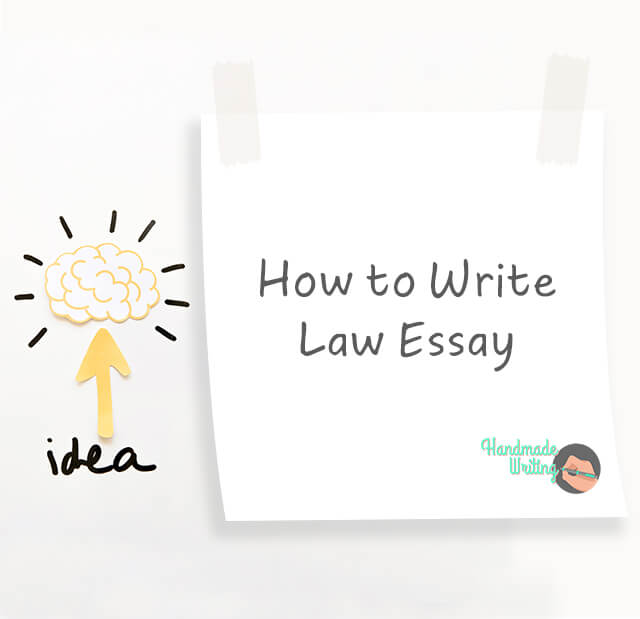
First things first, let’s discuss the legal essay scheme. It is rightly similar to the social science essay scheme. In both papers, it is necessary to explain a position on a particular issue or comment on a statement. For university law essay, especially in cases of specialties, it’s more complicated. There are several legal essay types :
- essay on quote explanation . Like in a school essay, the task here is to reveal the meaning of the expression and give a reasoned agreement or disagreement with it.
- essay on legal theory. The essence of this task is to describe one of the theories of law or any jurisprudence. This can be anything – for example, the theory that touches the Fifth Amendment.
- jurisprudence essay. In this assignment, you should review a specific case study or analyze the given document. Here, it’s important to adhere to special structure: first read the case, comprehend it, and only then give a critical account of this or that piece.
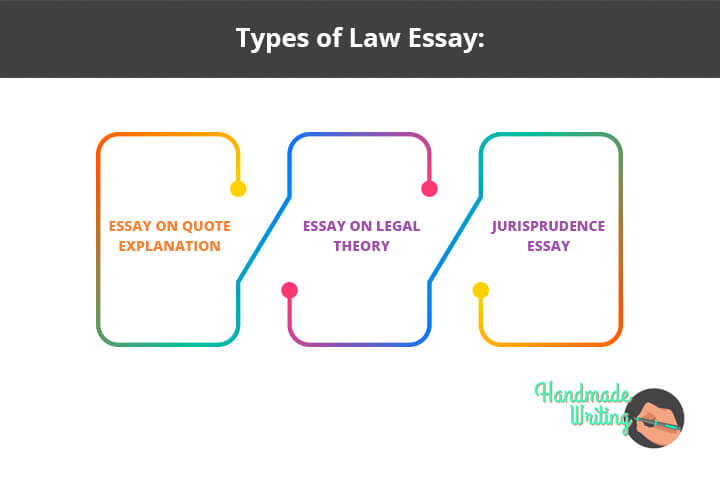
Law Essay Outline
The outline is one of the essential parts of law essay writing. At the point of creating it, you should jot down the structure of the main argument for each and every statement you deem appropriate for a text. This way, it’ll be much easier for you to organize the legal paper and facilitate its readability .
For example, if you need to comment on the quotation, it’s better to start an essay with brief information about the author. Then, consider the meaning of the citation in the context of his time and compare it to current conditions, as well as note whether you agree with the statement or not. Remember – the main task is to have a solid opinion in which you’re 100% confident. If not, switch the quote.
In the essay on legal theory, state the history of the issue, highlight the advantages and disadvantages of the case you are analyzing. Try to draw a parallel with the present, to indicate how relevant it is now for contemporary law students.
While reviewing a specific legal case or document, you should not be distracted by elements irrelevant or unrelated to the subject and give descriptions of similar situations. Consistently assess the actions of subjects or conduct an in-depth analysis of the provided regulation.
Write all of the crucial points in a short plan and shorten the above information into a couple of sentences. Afterward, you’ll be ready to use the crafted outline and write a law essay according to its key points .
Law Essay Structure
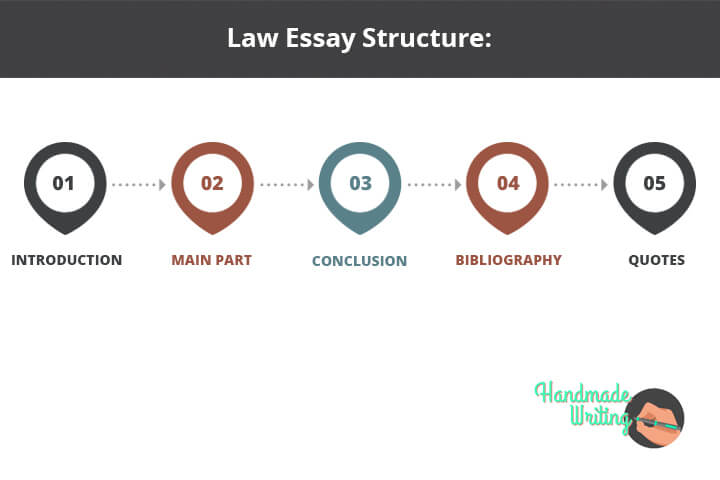
1. Introduction
Like any other type of writing, law essays start with introduction. A successful lead in is the one that captures attention instantly and forces readers to become interested in the law topic. In the beginning, you’ll need to clearly and precisely formulate a thesis statement of the entire piece, which you will then reveal in the following text. A great way to elaborate mediocre introduction with engaging filling is to state a concrete problem, controversy or issue that needs to be resolved.
2. Main part
This is the main element of the whole legal essay. It should contain an analysis of the quotation, legal theory, specific case, or document. Plus, your opinions about this or that aspect should be argued: for example, by references to other papers or practices. Another beneficial way to develop the main body of your essay is to use specific examples from law classes, including activities and important discussions , if applicable. Also, don’t forget that your law essay should always follow the thesis and develop it throughout the legal paper. This is a critical point to consider, as any departure from the established scheme will distort your work’s content.
3. Conclusion
Your finishing remarks should formulate the outcome of what was written above. A reasonable conclusion should be brief and powerful , as well as connected to the introduction. Besides, a good ending should contain a thesis of the whole law essay. However, don’t try to repeat your thesis word by word. Consider rephrasing it instead of mentioning the same statements so that the information is more easily digested for readers. Plus, you’ll need to provide a critical analysis of your work. For this, explain why your main argument backed up by primary and secondary sources is the highest point of conviction. Hence, your readers will see explicit reasoning and be more inclined to believe the truth you outlined in the paper.
4. Bibliography
A bibliography is a mandatory part of the work, and also the last one. At the end of your essay, you should list the documents (laws and other regulations) and books that were used in preparation for the article. Works cited page will help you validate the credibility of work and show readers that all statements and opinions are proven with relevant evidence. However, it doesn’t mean that your bibliography ought to be inserted just after you’ve written the entire text. To have a better vision of what source to pick for citing, include the list of used materials before writing the final version of your law essay. Accordingly, you’ll see sources in their entirety and easily cite them whenever needed.
The sayings of influential and famous people imbue any work with an air of authority . This is especially true for essays on law: professors appreciate it when students reinforce their considerations with the opinion of leaders and experts in their field.
Quotes for an essay on law are quite easy to find on the Internet or specialized digests.

If you choose to close the paper with a quote, it’ll be a great hook which will keep readers impressed by the essay long after they digest it. But feel free to add meaningful sayings also in the introduction or in the middle of a paper. Either way, quotes are a tool that helps make your reading highly impactful and appreciated.
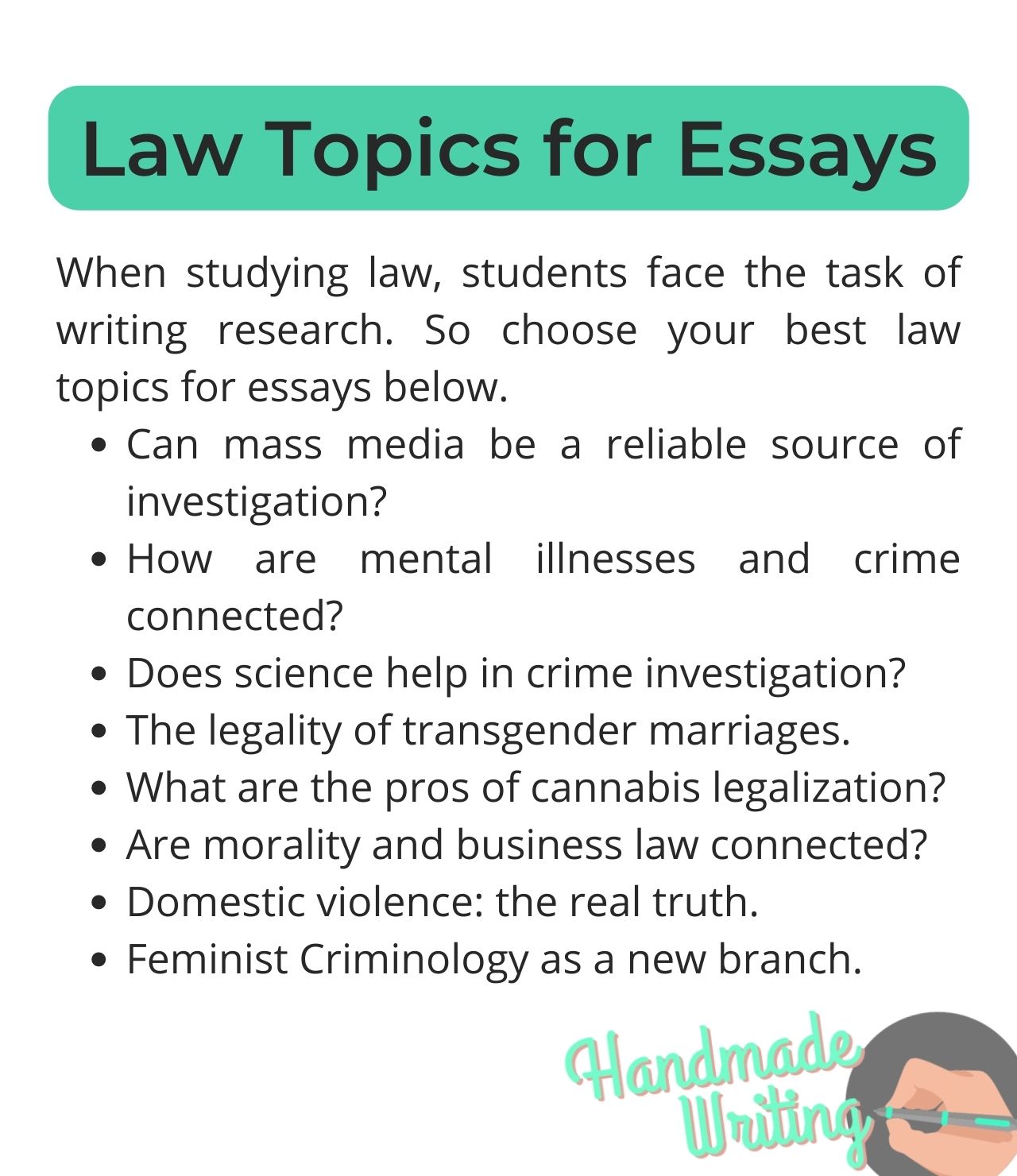
These were the top advice on how to create a distinct law paper. We hope our advice will help you prepare an interesting and informative essay for college or university studies that’ll be graded with the highest mark. Once you manage to operate on the subtle art of legal essay writing, you’ll adjust to the complexities of its realization without difficulties. If you’re in doubt questioning your writing abilities, use custom essay writer service – we will create the best law essay tailored specifically for you.

A life lesson in Romeo and Juliet taught by death
Due to human nature, we draw conclusions only when life gives us a lesson since the experience of others is not so effective and powerful. Therefore, when analyzing and sorting out common problems we face, we may trace a parallel with well-known book characters or real historical figures. Moreover, we often compare our situations with […]

Ethical Research Paper Topics
Writing a research paper on ethics is not an easy task, especially if you do not possess excellent writing skills and do not like to contemplate controversial questions. But an ethics course is obligatory in all higher education institutions, and students have to look for a way out and be creative. When you find an […]

Art Research Paper Topics
Students obtaining degrees in fine art and art & design programs most commonly need to write a paper on art topics. However, this subject is becoming more popular in educational institutions for expanding students’ horizons. Thus, both groups of receivers of education: those who are into arts and those who only get acquainted with art […]

How to plan an essay: Essay Planning
- What's in this guide
- Essay Planning
- Additional resources
How to plan an essay
Essay planning is an important step in academic essay writing.
Proper planning helps you write your essay faster, and focus more on the exact question. As you draft and write your essay, record any changes on the plan as well as in the essay itself, so they develop side by side.
One way to start planning an essay is with a ‘box plan’.
First, decide how many stages you want in your argument – how many important points do you want to make? Then, divide a box into an introduction + one paragraph for each stage + a conclusion.
Next, figure out how many words per paragraph you'll need.
Usually, the introduction and conclusion are each about 10% of the word count. This leaves about 80% of the word count for the body - for your real argument. Find how many words that is, and divide it by the number of body paragraphs you want. That tells you about how many words each paragraph can have.
Remember, each body paragraph discusses one main point, so make sure each paragraph's long enough to discuss the point properly (flexible, but usually at least 150 words).
For example, say the assignment is
Fill in the table as follows:
Next, record each paragraph's main argument, as either a heading or topic sentence (a sentence to start that paragraph, to immediately make its point clear).
Finally, use dot points to list useful information or ideas from your research notes for each paragraph. Remember to include references so you can connect each point to your reading.
The other useful document for essay planning is the marking rubric .
This indicates what the lecturer is looking for, and helps you make sure all the necessary elements are there.
Pathways and Academic Learning Support

- << Previous: What's in this guide
- Next: Additional resources >>
- Last Updated: Feb 15, 2024 1:23 PM
- URL: https://libguides.newcastle.edu.au/essay_planning
Academic Development Centre
Essay plans, what can an essay plan assess.
Much of what an essay could without the detail and extended timeframe. The plan could be in written form, or diagrammatic as in a simple concept map / spider diagram.
The value of essay plans over essays is that we could require more plans than essays during a module and so cover a wider range of the curriculum. We noted above that one disadvantage of essays is that the strategic students only selecting the classes that cover ‘their chosen topic’. Not so easy to do if they have to plan for several topics ….
The Study Gurus (2018) provide an ‘different’ approach to structuring an essay plan:
Introduction:
Every essay needs an introduction (3-5 sentences), so at the top of your essay plan just jot down introduction or intro, so you remember to write one.
Paragraphs:
Every essay must be written in paragraphs. Each paragraph should explain one main idea, and needs to have the SEXI structure:
S: A Topic S entence. This tells the reader what the paragraph is going to be about. You only need to write down the jist of the topic sentence for each paragraph in your essay plan.
E: A full E xplanation of the point you’re making in this paragraph. This should make up the bulk of your paragraph. In your essay plan jot down what you’re going to explain.
X: e X amples or justifications that back up what you’ve said in that paragraph. Jot down what examples you’re going to include in your essay plan so you don’t forget to include them in your essay!
I: Why is this point I mportant? A really amazing essay would also explain why this point is important to the essay as a whole. What’s the significance of this point to the essay topic?
Conclusion:
Every essay needs a conclusion that briefly summarises what’s been said in the essay. You can just write down conclusion in your plan to make sure you write one.
This is simply used as an example here; you will be advising your students about essays in your discipline and how they should be structured and planned. Once you have established the planning process with them then it can become the assessment task.
Perhaps the strategy could be several plans are submitted and receive feedback and then students select one or more to complete for further grading.
Diversity & inclusion
Little different to full essays.
Academic integrity
Plans, like full essays, can be run through plagiarism checkers like Turnitin. It is important not to assume that by asking to see the plan you can guarantee that the essay is the students' own work or that the plan will be the students' own work. Essay mills or cheat sites are perfectly able to provide a plan, and then write an essay to that plan (or vice versa ).
Generative AI is incredibly adept at writing essay plans to prompts, which can include specific instructions (such as SEXI) and feedback on previous work that you or other lecturers may have given. AI can help students to generate and refine ideas, provide examples, summarise the literature and is increasingly sophisticated. AI can provide individuated support to scaffold student thinking and writing, and as part of an iterative and dialogic process can be integrated into student work so seamlessly that students might struggle to identify precisely what is them and what is AI.
Seeing essay plans as a thinking/learning tool - and emphasising the formative function - should minimise anxiety around AI/academic integrity. Framing essay plans as a powerful mechanism to generate productive feedback that will help students do their best work in an essay will promote academic integrity.
(Click here for further guidance on designing for academic integrity .)
Useful resources
Richardson, J.T.E. (2015) Coursework versus examinations in end-of-module assessment: a literature review, Assessment & Evaluation in Higher Education . 40 (3), 439-455.
A Political Science guide
https://politicalscienceguide.com/home/policy-paper/
Advice about writing research proposals
From the University of Birmingham
https://www.birmingham.ac.uk/schools/law/courses/research/research-proposal.aspx
From the University of Nottingham
https://www.nottingham.ac.uk/pgstudy/how-to-apply/how-to-write-a-research-proposal.aspx
Healey, M. and Jenkins, A. (2009) Developing undergraduate research and inquiry.
https://www.heacademy.ac.uk/knowledge-hub/developing-undergraduate-research-and-inquiry
Advice on essay planning
From the University of Sheffield
https://www.sheffield.ac.uk/ssid/301/study-skills/writing/academic-writing/planning-structure
From the University of Reading
https://libguides.reading.ac.uk/essays/planning
Annotated bibliography
Class participation
Concept maps
Essay variants: essays only with more focus
- briefing / policy papers
- research proposals
- articles and reviews
- essay plans
Film production
Laboratory notebooks and reports
Objective tests
- short-answer
- multiple choice questions
Oral presentations
Patchwork assessment
Creative / artistic performance
- learning logs
- learning blogs
Simulations
Work-based assessment
Reference list
- Access course
- Course Package
- Access template
- Template package
- Public Law Revision Notes
- Contract Law Revision Notes
- Tort Law Revision Notes
- Equity & Trusts Law Revision Notes
- Land Law Revision Notes
- Essay plans
- Essay proofreading
First Class Law Essay Structure Plans
From an llb lecturer, see example essay plan:, frequently asked questions.
7 Steps for Writing an Essay Plan
Have you ever started writing an essay then realized you have run out of ideas to talk about?
This can make you feel deflated and you start to hate your essay!

The best way to avoid this mid-essay disaster is to plan ahead: you need to write an Essay Plan!
Essay planning is one of the most important skills I teach my students. When I have one-to-one tutorials with my students, I always send them off with an essay plan and clear goals about what to write.
Essay Planning isn’t as dull as you think. In fact, it really does only take a short amount of time and can make you feel oh so relieved that you know what you’re doing!
Here’s my 7-Step method that I encourage you to use for your next essay:
The 7-Step Guide on How to write an Essay Plan
- Figure out your Essay Topic (5 minutes)
- Gather your Sources and take Quick Notes (20 minutes)
- Brainstorm using a Mind-Map (10 minutes)
- Arrange your Topics (2 minutes)
- Write your topic Sentences (5 minutes)
- Write a No-Pressure Draft in 3 Hours (3 hours)
- Edit your Draft Once every Few Days until Submission (30 minutes)
I’ve been using this 7-Step essay planning strategy since I was in my undergraduate degree. Now, I’ve completed a PhD and written over 20 academic journal articles and dozens of blog posts using this method – and it still works!
Let’s go through my 7 steps for how to write an essay plan.
Prefer to Watch than Read? Here’s our video on writing an Essay Plan.
how to write an essay plan
1. figure out your essay topic. here’s how..
Where did your teacher provide you with your assessment details?
Find it. This is where you begin.
Now, far, far, far too many students end up writing essays that aren’t relevant to the essay question given to you by your teacher. So print out your essay question and any other advice or guidelines provided by your teacher.
Here’s some things that your assessment details page might include:
- The essay question;
- The marking criteria;
- Suggested sources to read;
- Some background information on the topic
The essay question is really important. Once you’ve printed it I want you to do one thing:
Highlight the key phrases in the essay question.
Here’s some essay questions and the key phrases you’d want to highlight:
This strategy helps you to hone in on exactly what you want to talk about. These are the key phrases you’re going to use frequently in your writing and use when you look for sources to cite in your essay!
The other top thing to look at is the marking criteria. Some teachers don’t provide this, but if they do then make sure you pay attention to the marking criteria !
Here’s an example of a marking criteria sheet:
Sample Essay Topic: Is Climate Change the Greatest Moral Challenge of our Generation?
Now, if you have a marking criteria you really need to pay attention to this. You have to make sure you’ve ticked off all the key criteria that you will be marked on. For the example above, your essay is going to have to make sure it:
- Takes a position about whether climate change is a serious challenge for human kind;
- Discusses multiple different people’s views on the topic;
- Explores examples and case studies (‘practical situations’);
- Uses referencing to back up your points.
The reason you need to be really careful to pay attention to this marking criteria is because it is your cheat sheet: it tells you what to talk about!
Step 1 only takes you five minutes and helps you to clearly clarify what you’re going to be talking about! Now your mind is tuned in and you can start doing some preliminary research.
2. Gather your Sources and take Quick Notes. Here’s how.
Now that you know what your focus is, you can start finding some information to discuss. You don’t want to just write things from the top of your head. If you want top marks, you want some deep, detailed and specific pieces of information.
Fortunately, your teacher has probably made this easy for you.
The top source for finding information will be the resources your teacher provided. These resources were hand picked by your teacher because they believed these were the best sources available our there on the topic. Here are the most common resources teachers provide:
- Lecture Slides;
- Assigned Readings.
The lecture slides are one of the best resources for you to access. Lecture slides are usually provided online for you. Download them, save them on your computer, and dig them up when it’s time to write the essay plan.
Find the lecture slides most relevant to your topic. To take the example of our climate change essay, maybe climate change is only discussed in three of the weeks in your course. Those are the three weeks’ lecture slides you want to hone-in on.
Flick through those lecture slides and take quick notes on a piece of paper – what are the most important topics and statistics that are relevant to your essay question?
Now, move on to the assigned readings . Your teacher will have selected some readings for you to do for homework through the semester. They may be eBooks, Textbooks or Journal Articles.
These assigned readings were assigned for a reason: because they have very important information to read ! Scan through them and see if there’s any more points you can add to your list of statistics and key ideas to discuss.
Next, try to find a few more sources using Google Scholar. This is a great resource for finding more academic articles that you can read to find even more details and ideas to add to your essay.
Here’s my notes that I researched for the essay question “Is Climate Change the Greatest Moral Challenge of our Generation?” As you can see, it doesn’t have to be beautiful #Studygram notes! It’s just rough notes to get all the important information down:

Once you’ve read the assigned lecture slides and readings, you should have a good preliminary list of ideas, topics, statistics and even quotes that you can use in step 3.
3. Brainstorm using a Mind-Map. Here’s how.
Do your initial notes look a little disorganized?
That’s okay. The point of Step 2 was to gather information. Now it’s time to start sorting these ideas in your mind.
The best way to organize thoughts is to create a Mind-Map. Here’s how Mind-Maps often look:

For your essay plan Mind-Map, write the essay question in the middle of the page and draw a circle around it.

Then, select the biggest and most important key ideas that you think are worth discussing in the essay. To decide on these, you might want to look back at the notes you took in Step 2.
Each key idea will take up around about 200 – 350 words (1 to 2 sentences).
Here’s a rough guide for how many key ideas you’ll want depending on your essay length:
- 1000-word essay: 3 to 4 key ideas
- 1500-word essay: 5 to 7 key ideas
- 2000-word essay: 6 to 8 key ideas
- 3000-word essay: 9 to 12 key ideas
Once you’ve selected your key ideas you can list them in a circle around the essay question, just like this:

Last, we need to add detail and depth to each key idea. So, draw more lines out from each key ideas and list:
- Two sources that you will cite for each key idea;
- A statistic or example that you will provide for each key idea;
- Any additional interesting facts for each key idea
Here’s how it might look once you’re done:

4. Arrange your Topics. Here’s how.
You’re well and truly on your way to getting your essay down on paper now.
There’s one last thing to do before you start getting words down on the manuscript that you will submit. You need to arrange your topics to decide which to write first, second, third, fourth, and last!
Here are some things to keep in mind:
- Start and end with your strongest points;
- Ensure the points logically flow.
To ensure your points logically flow, think about how you’re going to transition from one idea to the next . Does one key point need to be made first so that the other ones make sense?
Do two key points seem to fit next to one another? If so, make sure you list them side-by-side.
Have a play around with the order you want to discuss the ideas until you’re comfortable. Then, list them in order. Here’s my order for my Climate Change essay:
Each of these key ideas is going to turn into a paragraph or two (probably two) in the essay.
5. Write your topic Sentences in just 5 minutes. Here’s how.
All good essays have clear paragraphs that start with a topic sentence . To turn these brainstormed key points into an essay, you need to get that list you wrote in Step 5 and turn each point into a topic sentence for a paragraph.
It’s important that the first sentence of each paragraph clearly states the paragraph’s topic. Your marker is going to want to know exactly what your paragraph is about immediately. You don’t want your marker to wait until the 3 rd , 4 th or 5 th line of a paragraph before they figure out what you’re talking about in the paragraph.
So, you need to state what your key idea is in the first sentence of the paragraph.
Let’s have a go at turning each of our key ideas into a topic sentence:
6. Write a No-Pressure Essay Draft in just 3 Hours. Here’s how.
Okay, now the rubber hits the road. Let’s get writing!
When you write your first draft, don’t put pressure on yourself. Remind yourself that this is the first of several attempts at creating a great essay, so it doesn’t need to be perfect right away. The important thing is that you get words down on paper.
To write the draft, have a go at adding to each of your topic sentences to turn them into full paragraphs. Follow the information you wrote down in your notes and Mind-Map to get some great details down on paper.
Forget about the introduction and conclusion for now. You can write them last.
Let’s have a go at one together. I’m going to choose the paragraph on my key idea “Is climate change caused by humans?”
I’ve already got my first sentence and my brainstormed ideas. Let’s build on them to write a draft paragraph:

- “Most scientists believe climate change is caused by humans. In fact, according to the IPCC, over 98% of climate change scientists accept the scientific data that climate change is caused by humans (IPCC, 2018). This figure is very high, signalling overwhelming expert consensus. This consensus holds that the emission of carbon from burning of fossil fuels in the 20 th Century is trapping heat into the atmosphere. However, a minority of dissenting scientists continue to claim that this carbon build-up is mostly the fault of natural forces such as volcanoes which emit enormous amounts of carbon into the atmosphere (Bier, 2013).”
Your turn – have a go at your own draft paragraphs based on your Mind-Map for your essay topic! If you hit a rut or have some trouble, don’t forget to check out our article on how to write perfect paragraphs .
Once you’ve written all your paragraphs, make sure you write an introduction and conclusion .
Gone over the word count? Check out our article on how to reduce your word count.
7. Edit your Draft Once every Few Days until Submission. Check out this simple approach:
Okay, hopefully after your three hour essay drafting session you’ve got all your words down on paper. Congratulations!
However, we’re not done yet.
The best students finish their drafts early on so they have a good three or four weeks to come back and re-read their draft and edit it every few days.
When coming back to edit your draft , here’s a few things to look out for:
- Make sure all the paragraph and sentence structure makes sense. Feel free to change words around until things sound right. You might find that the first time you edit something it sounds great, but next time you realize it’s not as good as you thought. That’s why we do multiple rounds of edits over the course of a few weeks;
- Check for spelling, grammar and punctuation errors;
- Print out your draft and read it on paper. You notice more mistakes when you read a printed-out version;
- Work on adding any more details and academic sources from online sources like Google Scholar to increase your chance of getting a top grade. Here’s our ultimate guide on finding scholarly sources online – it might be helpful for this step!
Before you go – Here’s the Actionable Essay Plan Tips Summed up for you
Phew! That essay was tough. But with this essay plan, you can get through any essay and do a stellar job! Essay planning is a great way to ensure your essays make sense, have a clear and compelling argument, and don’t go off-topic.
I never write an essay without one.
To sum up, here are the 7 steps to essay planning one more time:
The 7-Step Guide for How to Write an Essay Plan

Chris Drew (PhD)
Dr. Chris Drew is the founder of the Helpful Professor. He holds a PhD in education and has published over 20 articles in scholarly journals. He is the former editor of the Journal of Learning Development in Higher Education. [Image Descriptor: Photo of Chris]
- Chris Drew (PhD) https://helpfulprofessor.com/author/chris-drew-phd/ 5 Top Tips for Succeeding at University
- Chris Drew (PhD) https://helpfulprofessor.com/author/chris-drew-phd/ 50 Durable Goods Examples
- Chris Drew (PhD) https://helpfulprofessor.com/author/chris-drew-phd/ 100 Consumer Goods Examples
- Chris Drew (PhD) https://helpfulprofessor.com/author/chris-drew-phd/ 30 Globalization Pros and Cons
1 thought on “7 Steps for Writing an Essay Plan”
Nice fun and concise approach to essays, thank you
Leave a Comment Cancel Reply
Your email address will not be published. Required fields are marked *

When you are able to develop a skill in essay writing , you will realize how it is able to take your time and a lot of patience to improve more. Writing an essay would help you talk about a particular worldly issue without showing any biases. Essays are more on facts and a little of your opinion. Essays give writers the chance to incorporate their own experiences, the way how they think and their ability provide research data. It is an essential part in the learning process that enables you to mark your point of view. In this article, you will be able to encounter more about the idea of creating a simple yet presentable essay plan .
10+ Essay Plan Examples
1. essay plan template.
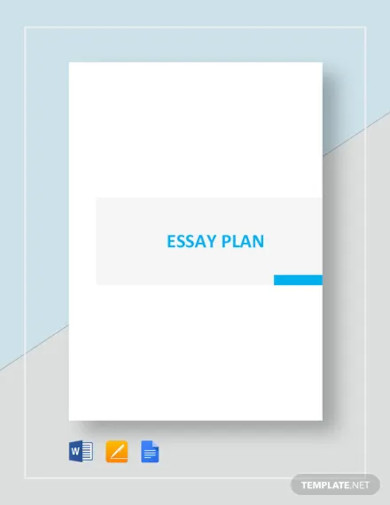
- Google Docs
2. Essay Plan Mind Map Template
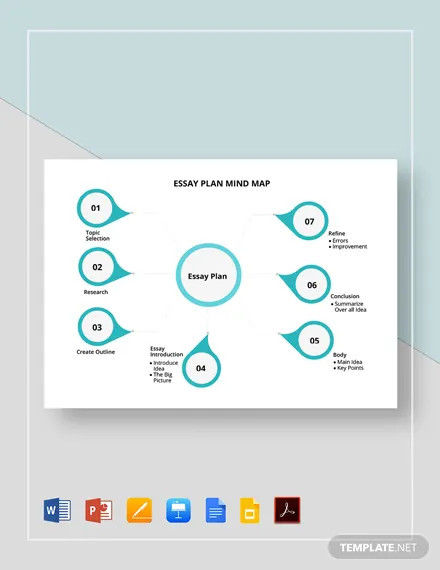
- Google Slides
3. New Essay Plan Template
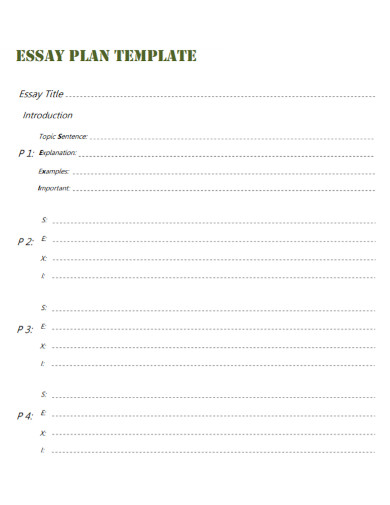
Size: 208 KB
4. Good Essay Plan
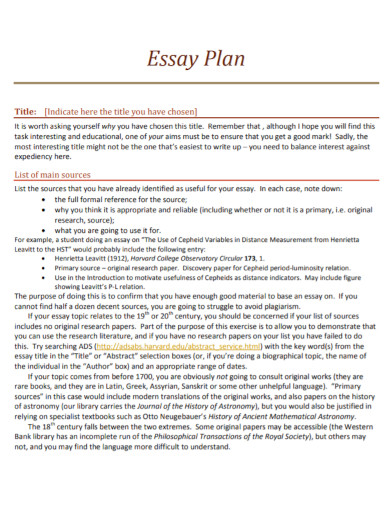
Size: 114 KB
5. Assignment Essay Plan
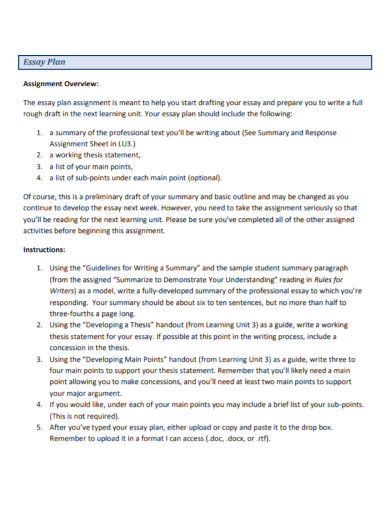
Size: 596 KB
6. Accessible Essay Plan
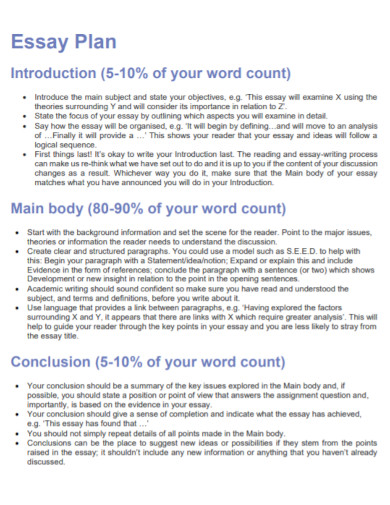
Size: 57 KB
7. Outlining of Essay Plan
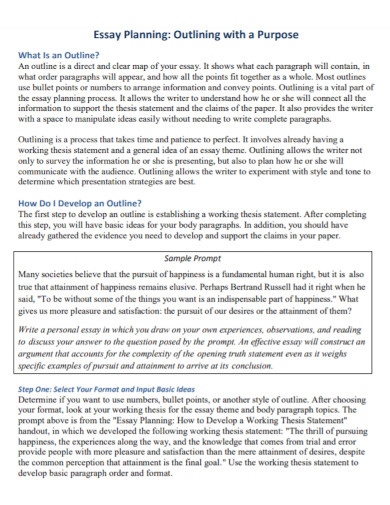
Size: 457 KB
8. Argumentative Essay Plan
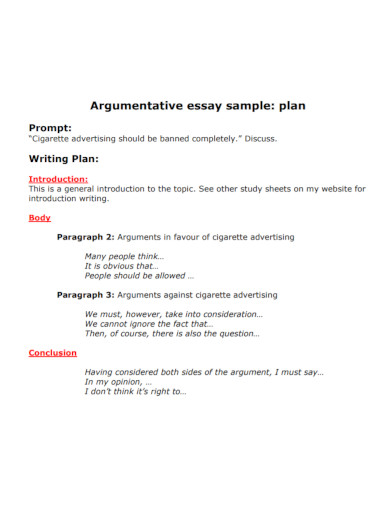
Size: 97 KB
9. Semantic Structure Essay Plan
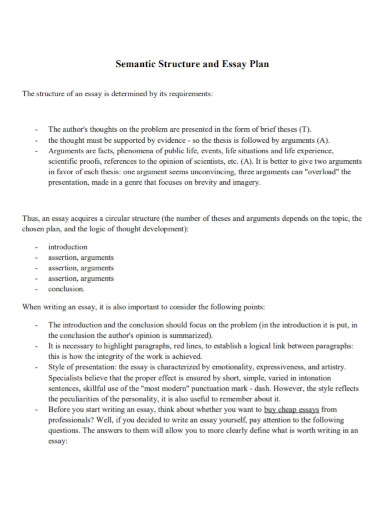
10. Basic Essay Plan
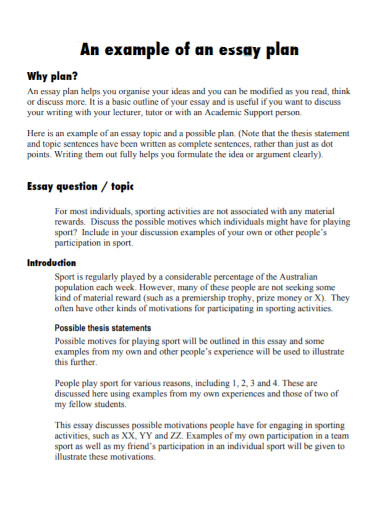
Size: 427 KB
11. Essay Plan Checklist
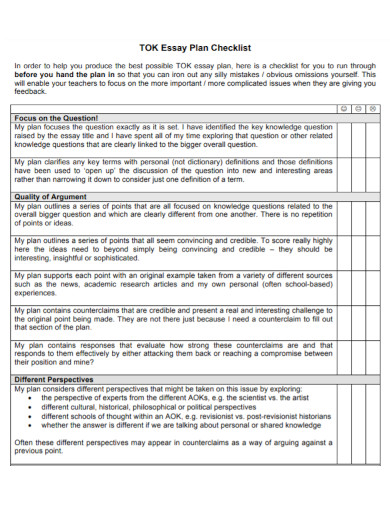
Size: 58 KB
What is an Essay Plan?
An essay plan is an act of making you practice how to organize ideas and make further modifications. It serves as an outline that is essential to use for discussing or writing about a certain issue. The purpose of an essay is to practice your mind on how to focus on an area where it can bring you to make a quality conclusion .
Planning is the way how you are able to visualize regarding the content of your essay. You should make sure that your essay is well-planned. Otherwise, you will end up having a sequence of phrases that are not even organized. Your main points should be clear and logically stated.
10 Steps for Essay Planning
- Read and analyze the essay questions.
- Write down the essay questions.
- Brainstorm or think of more ideas regarding the matter.
- List down all of your thoughts and the scope that covers the essay questions.
- Take note of the words or phrases that you think are essential in your work.
- Write down the main points that can be used to answer the questions.
- Look through any type of handouts that can be used to have a more detailed outline of your essay.
- Do not forget to take note of the sources of all the information you got. This will be indicated in the reference list.
- Do not make your outline too complicated.
- Think about how many words you need to write, the elements that you cover in your essay and how much space you should be able to allot to each of your outline section.
Here is an outline of your essay that you need to follow:
- Essay question or topic
- Introduction – this includes your thesis statement
- 1 st Paragraph – this includes your topic sentence and evidence
- 2 nd Paragraph – this also contains a topic sentence and evidence
- 3 rd Paragraph – just like the first and second paragraph, it contains a topic sentence or an idea that is supported by an evidence or claim
- Conclusion – provides the possible motivations and restatement of central idea
- Reference – the list of the sources of your texts, data or images that you do not own
What is a good essay?
A good essay must have one clear main idea. Each of the paragraphs must have a topic sentence to be supported with a supporting detail. They should be organized logically and must be able to stick together. Always make sure that an essay would give a best impression to the readers.
What is the standard number of paragraphs per essay?
Essays must have at least five paragraphs.
What is the best way to start an essay plan?
The best way to start an essay plan is to prepare a box plan that consists of the essay elements. These elements will serve as your guide to be able to write continuously without getting lost of the usual standard arrangement.
Effective essay planning helps in making your work be done immediately. It speeds up your writing process and gives you precise direction while working on it. You just have to follow the correct structure and format of your essay. Always consider your audience when making an essay because they are the ones who will give you feedback about it. The attention that they should give also matters.

Essay Plan Generator
Text prompt
- Instructive
- Professional
Create an Essay Plan on how you organize your study schedule and its benefits
Develop an Essay Plan on the role of exercise in student life

IMAGES
VIDEO
COMMENTS
Restate key supporting arguments. The final stage of creating the plan of your law essay is to pick 2 to 3 key supporting arguments which you discussed in the main body of your paper and outline them again. This time, however, you will not be getting into a detailed discussion of how case law or statute sections justify your supporting arguments.
Planning Your Law Essay. The next step is to plan your essay: as we identified, the minimum requirements will be an introduction, body and conclusion, unless you are dealing with a report or dissertation. When you have done some research, you may wish to make a rough plan of where you intend to go with the essay. For example:
Here is a comprehensive guide to help you plan and outline your law essays effectively. 1. Understand the Question. Before you start, it is crucial to thoroughly understand the essay question or topic. Law essays often come with specific prompts that require you to analyse a legal scenario, compare legal theories, or evaluate the application of ...
Writing a law essay requires a strategic approach, and a well-organised plan is the key to a successful essay. A thoughtful essay plan not only helps in structuring your arguments coherently but also ensures that you address all relevant legal issues. In this guide, we will explore the essential steps to create an effective law essay plan ...
In this article, we'll cover some top tips to guide you through the process of planning, researching, structuring and writing a first-class law essay with confidence. 1. Start In Advance. Give yourself plenty of time to plan, research and write your law essay. Always aim to start your law essay as soon as you have the question.
This resource offers tips and resources to help you plan and write law essays. There are usually two types of law essays: the theoretical based essay and the problem-style essay. The theoretical based essay may ask you to critically discuss a new piece of legislation or a recent case in relation to existing laws or legal principles.
A strong piece of writing always addresses opposing points of view. You should accurately paraphrase any counter-argument to an argument you put forth, and then use evidence and analysis to argue why your reader should be persuaded by your argument and not by the counter-argument. 6. Draft a conclusion.
Planning Your Law Essay. The next step is to plan your essay: as we identified, the minimum requirements will be an introduction, body and conclusion..... Interpreting Law Essay Questions. Example help guide. Last modified: 5th May 2020. Interpreting Law Essay Questions. The first step with a law essay question is to identify what exactly you ...
Here are some practical and practical tips for planning a one good law essay. Highlight specific words and phrases in the essay's title. Take a brain dump for the words that you have highlighted and note them down. Find a connection between these phrases and words. Develop a strategy to come up with your answer basedon these phrases.
The Introduction. You should aim to do four things in your introduction: Set out any definitions of any key terms outlined in the essay title or statement of your essay. State what the overall aim of your essay is. Explain how you plan to achieve this aim. Provide a brief summary of what your essay will conclude.
10 Apr. Written By Law Tutor. Various steps are involved in creating a plan for a law essay. This includes writing, brainstorming, outlining, creating the draft, and submitting the work. The most effective way to arrange the tasks is to create an outline of one's essay. This will allow a person to keep track of your tasks and ensure you do not ...
The introduction should also provide a roadmap to a user by illustrating the structure used in a paper. A classic example of a law essay is the following: "The essay will be divided into four main sections. In section I, the essay will provide an in-depth understanding of …. Act.
The essay template allows you to plan essays from 500 words to 5,500 words long. This covers most essays set at law schools around the UK, including in public law, criminal law, contract law, tort law, equity & trusts, land law, EU law and other law-related modules.
Write all of the crucial points in a short plan and shorten the above information into a couple of sentences. Afterward, you'll be ready to use the crafted outline and write a law essay according to its key points. Law Essay Structure. 1. Introduction. Like any other type of writing, law essays start with introduction.
• Historical - These questions will ask you how the law has developed in a particular area over the past and where it stands today by comparison. • Reform - This is kind of the opposite to historical essays. You will need to think about the law as it stands today and how it might change or develop in the future.
Essay planning is an important step in academic essay writing. Proper planning helps you write your essay faster, and focus more on the exact question. As you draft and write your essay, record any changes on the plan as well as in the essay itself, so they develop side by side. One way to start planning an essay is with a 'box plan'.
The example law essays below were written by students to help you with your own studies. If you are looking for help with your law essay then we offer a comprehensive writing service provided by fully qualified academics in your field of study. Law Essay Writing Service.
Every essay must be written in paragraphs. Each paragraph should explain one main idea, and needs to have the SEXI structure: S: A Topic S entence. This tells the reader what the paragraph is going to be about. You only need to write down the jist of the topic sentence for each paragraph in your essay plan. E: A full E xplanation of the point ...
The essay plans are available for all the core modules of an English law LLB degree, that is: constitutional and administrative law, criminal law, tort law, contract law, land law, equity & trusts, EU law and other selected modules, such as family law, medical law, company law etc. If you want to book a plan for a module other than one of the ...
Phew! That essay was tough. But with this essay plan, you can get through any essay and do a stellar job! Essay planning is a great way to ensure your essays make sense, have a clear and compelling argument, and don't go off-topic. I never write an essay without one. To sum up, here are the 7 steps to essay planning one more time: The 7-Step ...
Read and download a selection of free sample Law essays written by Oxbridge academics, as guidance and inspiration for your own research and learning. WhatsApp +44 (0) 207 391 9032 ; Order; Services. Essay Writing Services. Improve your own writing and grades. ... Subject: Human Rights Law; Type: Essay plan;
10 Steps for Essay Planning. Read and analyze the essay questions. Write down the essay questions. Brainstorm or think of more ideas regarding the matter. List down all of your thoughts and the scope that covers the essay questions. Take note of the words or phrases that you think are essential in your work.